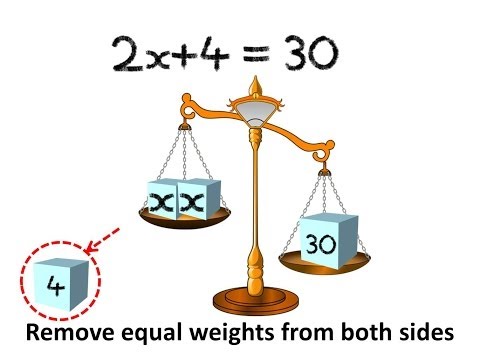CBSE worksheets for Simple Equations worksheet for class 7 in PDF for free download. Mathematics worksheets for class 7 CBSE includes worksheets on Simple Equations as per NCERT syllabus. CBSE class 7 worksheets as PDF for free download Simple Equations worksheets. Users can download and print the worksheets on class 7 Mathematics Simple Equations for free.
Download Simple Equations worksheet for class 7
Simple Equations worksheet for class 7 Important Topics
- Recall : Expressions and Equations
- Setting up an equation
- Solving an equation
- Tracing Back: from solution to equation
- Application of simple equations to practical situations
Some important Facts about Simple Equations worksheet for class 7
- An equation is a condition on a variable such that two expressions in the variable should have equal value.
- The value of the variable for which the equation is satisfied is called the solution of the equation. 3. An equation remains the same if the LHS and the RHS are interchanged.
- In case of the balanced equation, if we (i) add the same number to both the sides, or (ii) subtract the same number from both the sides, or (iii) multiply both sides by the same number, or (iv) divide both sides by the same number, the balance remains undisturbed, i.e., the value of the LHS remains equal to the value of the RHS
- The above property gives a systematic method of solving an equation. We carry out a series of identical mathematical operations on the two sides of the equation in such a way that on one of the sides we get just the variable. The last step is the solution of the equation.
- Transposing means moving to the other side. Transposition of a number has the same effect as adding same number to (or subtracting the same number from) both sides of the equation. When you transpose a number from one side of the equation to the other side, you change its sign. For example, transposing +3 from the LHS to the RHS in equation x + 3 = 8 gives x = 8 – 3 (= 5). We can carry out the transposition of an expression in the same way as the transposition of a number.
- We have learnt how to construct simple algebraic expressions corresponding to practical situations.
- We also learnt how, using the technique of doing the same mathematical operation (for example adding the same number) on both sides, we could build an equation starting from its solution. Further, we also learnt that we could relate a given equation to some appropriate practical situation and build a practical word problem/puzzle from the equation.
NCERT class 7 Mathematics Solved Worksheets
- Chapter 1 – Integers
- Chapter 2 – Fractions and Decimals
- Chapter 3 – Data Handling
- Chapter 4 – Simple Equations
- Chapter 5 – Lines and Angles
- Chapter 6 – Practical Geometry
- Chapter 7 – The Triangle and its Properties
- Chapter 8 – Congruence of triangles
- Chapter 9 – Comparing Quantities
- Chapter 10 – Rational numbers
- Chapter 11 – Perimeter and Area
- Chapter 12 – Algebraic Expressions
- Chapter 13 – Exponents and Powers
- Chapter 14 – Symmetry
- Chapter 15 – Visualizing Solid Shapes
CBSE Worksheets for class 7 Mathematics in PDF
- CBSE 7 Mathematics Integers
- CBSE 7 Mathematics Fractions and Decimals
- CBSE 7 Mathematics Data Handling
- CBSE 7 Mathematics Simple Equations
- CBSE 7 Mathematics Lines and Angles
- CBSE 7 Mathematics The triangle and its properties
- CBSE 7 Mathematics Congruence of triangles
- CBSE 7 Mathematics Comparing Quantities
- CBSE 7 Mathematics Rational Numbers
- CBSE 7 Mathematics Geometry
- CBSE 7 Mathematics Perimeter and Area
- CBSE 7 Mathematics Algebraic Expressions
- CBSE 7 Mathematics Exponents and Powers
- CBSE 7 Mathematics Symmetry
- CBSE 7 Mathematics Visualising solid shapes
REVIEW OF WHAT WE KNOW
The word variable means something that can vary, i.e. change. A variable takes on different numerical values; its value is not fixed. Variables are denoted usually by letters of the alphabets, such as x, y, z, l, m, n, p, etc. From variables, we form expressions. The expressions are formed by performing operations like addition, subtraction, multiplication and division on the variables. From x, we formed the expression (4x + 5). For this, first we multiplied x by 4 and then added 5 to the product. Similarly, from y, we formed the expression (10y – 20). For this, we multiplied y by 10 and then subtracted 20 from the product. All these are examples of expressions.
The value of an expression thus formed depends upon the chosen value of the variable. As we have already seen, when x = 1, 4x + 5 = 9; when x = 5, 4x + 5 = 25. Similarly,
when x = 15, 4 x + 5 = 4×15 + 5 = 65;
when x = 0, 4 x + 5 = 4 × 0 + 5 = 5; and so on.
To download Printable worksheets for class 7 Mathematics and Science; do check myCBSEguide app or website. myCBSEguide provides sample papers with solution, test papers for chapter-wise practice, NCERT solutions, NCERT Exemplar solutions, quick revision notes for ready reference, CBSE guess papers and CBSE important question papers. Sample Paper all are made available through the best app for CBSE students and myCBSEguide website.

Test Generator
Create question paper PDF and online tests with your own name & logo in minutes.
Create Now
Learn8 App
Practice unlimited questions for Entrance tests & government job exams at ₹99 only
Install Now